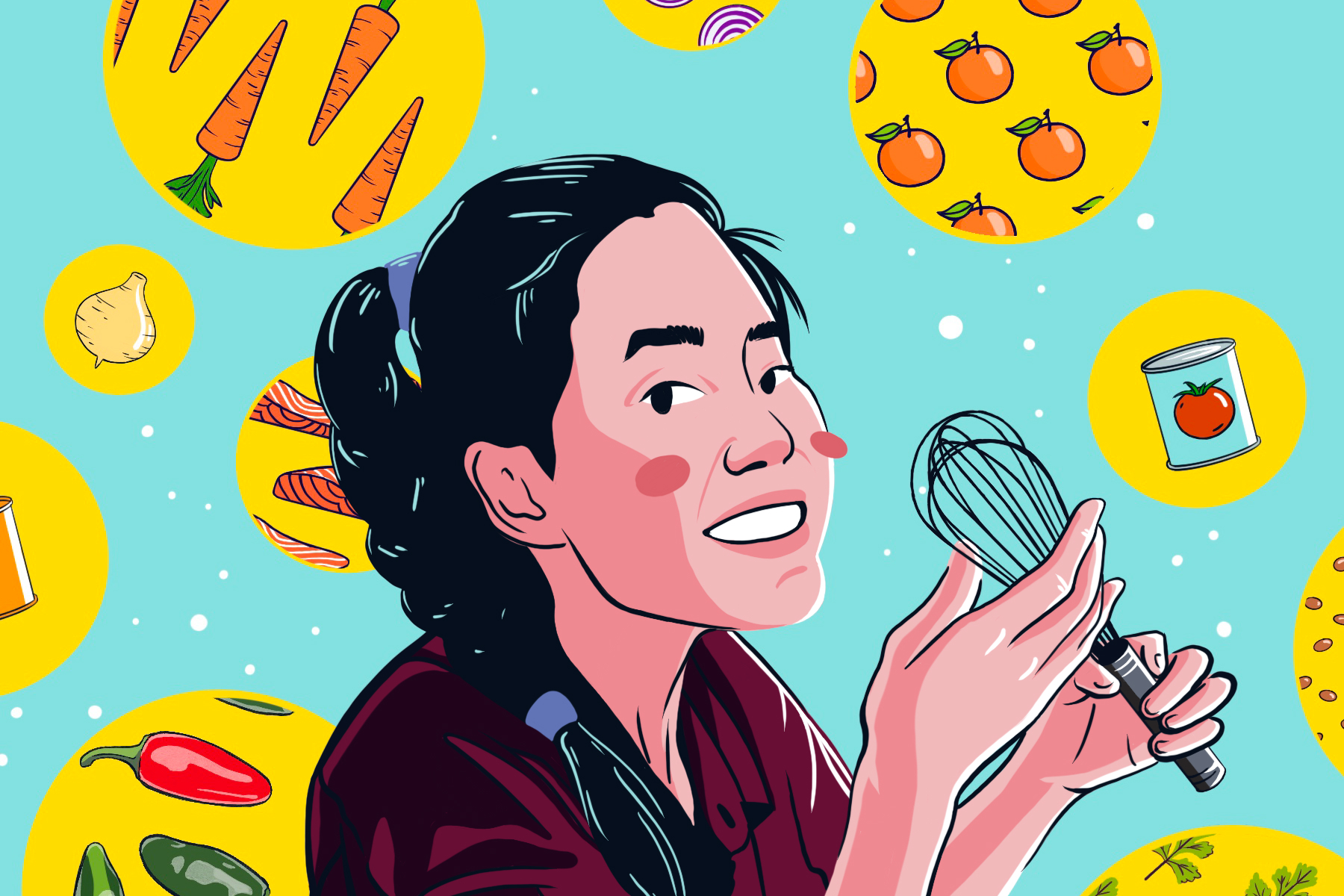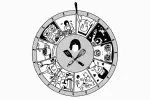Like many, many other people, I was a fan of the Bon Appétit Test Kitchen. I didn’t pay much attention to their release schedule, but I enjoyed watching the episodes after they came out. I also might’ve watched Claire Saffitz attempt to make a gourmet Ferrero Rocher more than once.
After Bon Appétit crashed and burned due to its mistreatment of their employees of color, I stayed away from the food entertainment side of YouTube. That is, until I discovered June Xie.
Xie, the host of the Delish web series “Budget Eats,” is a charismatic host. In every episode of the show, she makes around a week’s worth of food on a very tight budget — sometimes as low as $15. Xie’s sheer command of her craft makes the feat even more impressive: Each of the hour-long episodes is full of inventive recipes drawing inspiration from both Xie’s Chinese background and her knowledge of food from all over the world.
Many subscribers describe the “Budget Eats” series as honest, heartwarming and funny — and rightly so. Still, after the Bon Appétit implosion of last year, viewers and creators began interacting in the food entertainment ecosystem in different yet important ways. The success of “Budget Eats” and June Xie demonstrates what changed and what stayed the same.
Cooking Offline and Online
It’s no surprise why food entertainment is such a lucrative niche online. The human fascination with seeing the cooking process can be easily explained: Cooking is hypnotic. It’s an activity full of pleasant visual, auditory and olfactory stimuli. Think about the sizzle of a meatball as it hits the pan, or a bright yellow yolk being dropped into a bowl of cream-colored dough. Watching people make food induces the same mesmerizing quality. Or as the Internet calls it, it’s “oddly satisfying.”
The universal appeal of cooking is why YouTube’s food entertainment market is saturated. In a video titled “Cooking Food on the Internet For Fun And Profit,” YouTuber Dan Olson pointed out that starting an internet cooking show is like opening a restaurant: a bad idea. “Everyone thinks they can do it…Also, like a restaurant, there is a lot of competition and it can be really, really hard to find a niche and audience before you just burn out.”
Olson theorized that truly successful food content on YouTube can position itself across two out of three pillars: informational value, spectacle and personality. Informational value and personality are self-explanatory concepts; the appeal of a video can lie on its factual content, or on the charisma of its host. Spectacle, however, is a trickier concept. It can encompass different things, “from dishes made with absurdly expensive or difficult to obtain ingredients, to excessively large or complex constructions, to simply watching a master of their craft do something at an extremely high level of competence.”
For example, Epicurious’ “Amateur to Food Scientist” series gives its audience advice on how to elevate common recipes while also being deeply entertaining (the gap of skill between Level 1 and Level 3 chefs will always be amusing). Channels like How To Cake It or Ann Reardon’s How To Cook That series rely both on the personalities of their extremely charismatic hosts and the spectacle of their exuberant cake recipes.
But the highest-profile example of these criteria was the Bon Appétit Test Kitchen channel. In the case of the “Gourmet Makes” show, the spectacle came from the process of seeing a pastry chef reinvent known candies and pastries. However, as Bon Appétit grew in popularity, fans began paying more attention to the interactions between the chefs. Their candid, funny dynamics resembled those of a sitcom, and the chefs’ personalities became the spectacle.
Why “Budget Eats”?
The popularity of “Budget Eats” arose because the show meets all three criteria. Xie comes across as sarcastic, yet charismatic and kind; her videos feel like a comfort meal. The show’s premise — a limited budget creates a tension that must be solved throughout the episode — makes the show an entertaining spectacle.
Still, it’s not like YouTube lacks charming personalities. What makes “Budget Eats” truly stand apart from the crowd is its high production value. The show started during the early months of quarantine, which forced Xie to use her own home kitchen as a studio instead of the professionally equipped Delish studio. This was a strength disguised as a weakness. While Xie faced some space constraints by working alone in her kitchen, the cozy surroundings and hand-held camera techniques gave the show a cozy atmosphere.
Despite their relaxed atmosphere, the videos are not amateurish. Given that Delish is a branch of the multinational mass media conglomerate Hearst Communications Inc., it would be impossible for them to be. The editing of Budget Eats is extremely polished, as are the animations peppered across the show. Indeed, this high level of quality seems more like a requirement to succeed online. Recently, YouTube shifted toward a more polished aesthetic epitomized by Claire Saffitz’s Gourmet Makes. Even independent creators like Binging with Babish adopted the clean, almost minimalist aesthetic pioneered by media companies like Epicurious or Delish.
In this ecosystem, what makes June Xie stand out is her ability to live in a space between the professional and the DIY. The show is homemade but processed by a multinational media company.
A Parasocial Relationship
The comments section of the “Budget Eats” videos is filled with one sentiment: authenticity. Viewers thank Xie for her honesty, emotional maturity and relatability. They seem to connect with her on a personal level, a reaction prompted by the content of the videos themselves. Xie shares news about her partner, her cat and her mental health; viewers identify themselves with her. Just like with Bon Appétit, a strong parasocial relationship formed.
In 1956, theorists Donald Horton and Richard Wohl coined the term “parasocial relationship,” defined as a “seeming face-to-face relationship between spectator and performer.” While a parasocial relationship might feel as intimate and fulfilling as a normal friendship, it’s always one-sided, insusceptible to mutual development and controlled by the performer.
“Parasocial relationship” might seem like a strange term, but the phenomenon is actually very common. Think about how K-pop fans care about their idols’ emotional well-being, or about how the fans of an Instagram model might ask her about her family life. In fact, most Gen Zers have had some kind of parasocial relationship with an influencer, musician or actor since they’ve never known a world without the internet.
Parasocial relationships are not negative by themselves, but they can complicate situations when labor and compensation are involved. For Bon Appétit, this meant that a real, flawed workplace turned into sitcom dynamics, blinding some workers from the harsh truths about inequality on the Test Kitchen. This also meant that when the truth came out, many fans felt it as a personal betrayal. As Bettina Makalintal wrote in her analysis of the Bon Appétit scandal, “When we laud any product or person to this extent and make it an object of cultural obsession, it becomes easier to ignore the flaws and the parts of the conversation that don’t fit what we want to see.”
A Cooking Show In A World Post-Bon Appétit
In this landscape, Xie exemplifies a post-Bon Appétit internet food personality. People show an awareness of the material conditions behind her work. Viewers start petitions to get her a raise, and they mention their desire to make sure the company won’t overwork her. They also recognize the necessary distance between June Xie as a person and June Xie as the host of “Budget Eats.” As shown by her FAQ, which directly omits some questions due to their personal nature, she expresses her need for boundaries and privacy.
Most importantly, it seems as if Xie isn’t interested in meteoric growth. In order to achieve any modicum of fame online, one needs both skill and consistency. As long as one keeps cranking out material on a regular basis, they will likely be supported by a loyal following. But though Xie works a regular schedule, it’s not as fast-paced as that of other channels. She keeps a level of transparency about the difficulties of the video production process.
Online, where personalities and content can easily be altered, it’s difficult to distinguish between authenticity and fabricated charm. Still, it’s worth questioning if we need to distinguish between the two in the first place. Journalist Haley Nahman said that since it’s almost impossible to reach any meaningful mass mutual understanding through digital media, “we’d do better to accept social media’s limitations—and harness its more useful aspects—than try to overcome them through brute force, a project that’s mostly made the internet more frustrating and fraudulent.” Perhaps instead of seeing content creators as friends and seeking personal identification with them, it could be useful to decouple their work and value to us as people. “Budget Eats” and its fanbase seem to be doing that, but only time will tell us if this is a successful, or even possible, project.
















